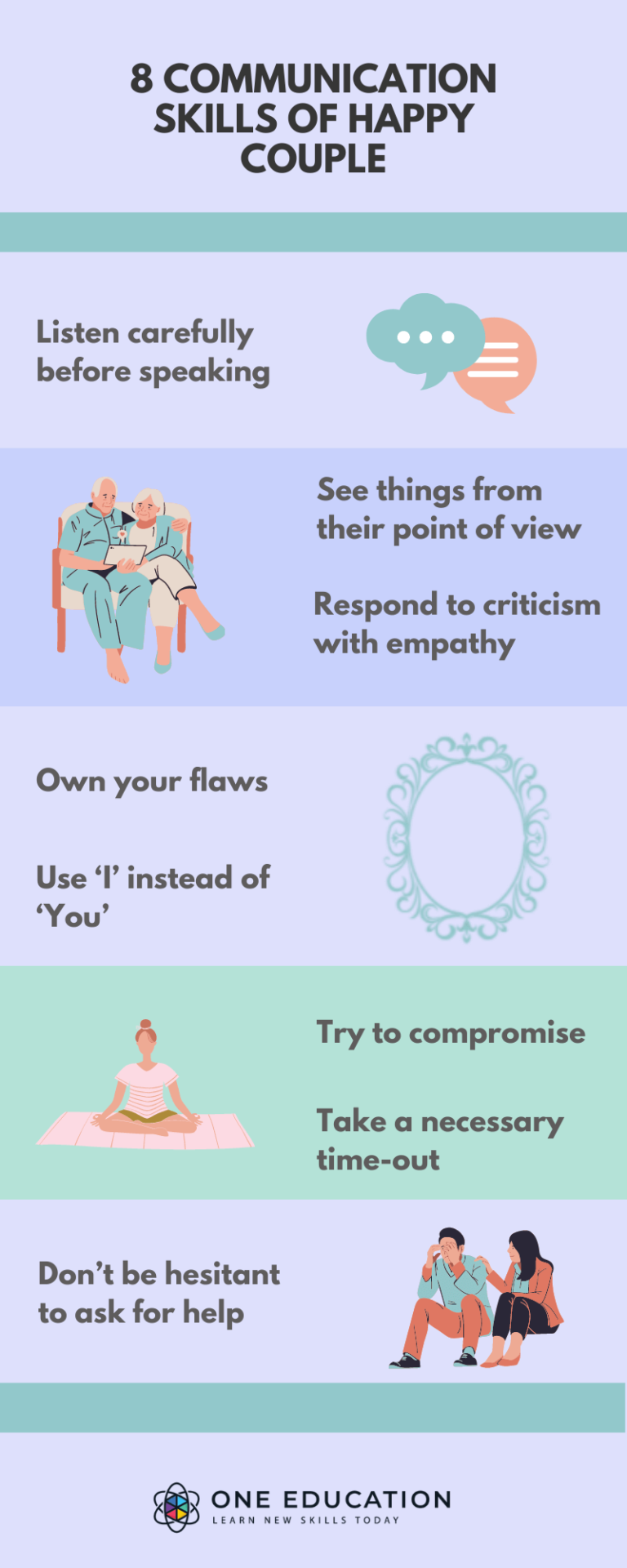What makes a marriage successful? This question has eluded men and women around the world for centuries now. There is certainly no one sure-fire way to answer it. But the importance of communication in marriage is well recognised by now. And for achieving good communication skills in marriage, it takes some practice indeed.
Today, we’ll look a little into the most effective communication skills in marriage. These are our top selected tips that are almost always likely to yield results!
Table of Contents
What is Marriage Communication?
What is marriage communication? Marital communication refers to the communication between spouses. It has both verbal and non-verbal components. A good marriage thrives on the open exchange of emotion, desires, and beliefs. In fact, communication is one of the most important aspects of a satisfying marriage.

Most marriages go through rough times. And that can change the way spouses communicate with each other. Eventually, many couples develop bad habits when things are on the down.
Nobody is born a natural communicator. But, just like bike-riding or baseball-playing, communication skills need work and practice. And good communication skills are the key to improving your relationship.
Psychoanalysts have been studying communication skills in marriage for years. Also, experts generally agree that communication forms widely vary between happy and unhappy couples.
Why is Communication Important in Marriage?
Why are communication skills in marriage important? Well, marriage satisfaction is one of the deciding factors for overall life quality. It contributes more to global happiness than the other aspects of life.

Authors Norval D. Glenn and Charles N. Weaver stated that in their journal article– ‘The Contribution of Marital Happiness to Global Happiness (February 1981).
Communication in marriage relationships is like a river stream. When thoughts and feelings flow in peace, it creates a beautiful ambience. However, when the situation is turbulent, it turns destructive just like that.
Because pressure builds up when communication gets obstructed, just like water flow. Then suddenly, when the words get a chance to flow again, they tend to come out in a forceful manner.
Having a good communication pattern is a struggle for many married couples. As a result, it’s common to avoid difficult conversations. This especially happens in the case of the important ones. Instead of being direct, they often end up being vague. Thus, the problem remains unresolved.
And then, the lack of a complete communication flow dries up their passion and love over time. This eventually can end up being a broken marriage. So, for stopping this from happening, communication in marriage is significantly essential.
The 8 Key Communication Skills in Marriage
What are the keys to communication skills in marriage? Research on successful marriages shows that it’s how couples communicate. Happy and joyous couples have a 5:1 ratio of positive to negative interactions on average. To learn more about how communication skills can change this key relationship of your life, check out this course on ‘Effective Communication Skills’ by One Education.

A happy relationship is where couples can open their heart and mind to talk freely. It is necessary to feel safe sharing their most private thoughts in a relationship. Happy couples comfortably express their concerns and opinions when needed. They voice their thoughts and concerns with clarity and maturity. Both marriage partners talk while being mature. They also keep a distance from hurtful, attacking, or criticising comments.
Happy partners listen to each other attentively. As a result, they don’t get bitter while talking. Instead, they approach their conversations with empathy and understanding. They do not dismiss what their partner has to say. And they do so even if they hold a different perspective. Thus, after having a conversation, they both feel good about the conversation.
Also, they feel their concerns have been considered and addressed. Later on, this encourages them to use the opportunity to talk with each other. And regardless of the seriousness or urgency of the issues, they make sure to follow through.
So if applicable next time, just try to keep the following eight tips in mind:
1. Listen carefully before speaking
2. Be willing to see their point of view
3. Respond to criticism with empathy
4. Own your flaws
5. Use ‘I’ rather than ‘You’
6. Try to compromise
7. Take a necessary time-out
8. Don’t be hesitant to ask for help

1. Listen Carefully Before Speaking
Often people think that they are listening. But in reality, they are searching for their next words as a response. Hence, be mindful the next time when you are in a conversation with your partner. Before you respond, try to listen with a complete presence of mind.

An effective conversation should flow from both ends- though it might be difficult. Try to have patience and listen to what your partner is saying. Do not interrupt, do not get defensive. Just hear them out. Respond appropriately so that they can sense your participation. At the end of their talk, you’ll understand better what they were trying to say. As a result, they will show the same patience and willingness to listen to you.
Pro Tip: Practise active listening in your daily conversations.
2. Be Willing to See Their Point of View
Craving to feel heard and understood is an inherent human tendency. Therefore, we focus a lot on proving our point right. Getting the other person to see things our way seems to matter the most. We all do it, so it’s understandable. However, prioritising our thought too much can backfire.

Imagine that your partner is doing the same thing. If they habitually put too much emphasis only on their perspective, how would you feel? Ironically, if you both focus on proving yourself right, no one will get heard in the end. As a result, everyone will end up feeling ignored and misunderstood. So, what’s the point of communicating?
Have an open mind to see the other side of the story. After that, you can better explain yours. In case you don’t get the point, ask questions until you do. Eventually, others will more likely be willing to do the same.
3. Respond to Criticism With Empathy
When someone is criticising us, it is easy for us to feel defensive. Criticism is always hard to accept. And that happens mainly because the other person’s emotions often magnify them. However, we must focus on the cause behind that criticism rather than the words. Therefore, try to listen to the pain and respond with empathy as much as possible.

Pro Tip: Practising mindfulness meditation can help you to better respond to criticism.
4. Own Your Flaws
Do you know personal responsibility is a strength rather than a weakness? Effective communication includes recognising and admitting when you’re wrong.

For example, if you have some responsibility in a conflict, look for and admit to what’s yours. Set your ego-self aside, set a good example, and show maturity. It will also inspire the other person to reflect in the same manner. As a result, it will lead you two closer to mutual understanding and a solution.
5. Use “I” Rather Than ‘You’
Rather than saying things like, “You couldn’t do this simple task,” choose some better words to express the situation. Begin with “I,” and turn the situation to yourself and your emotions. Here is an example- “I feel bad when this happens.”

It sparks less defensiveness and fewer accusations. Also, it will help the other person understand your feelings and perspective rather than feeling attacked.
6. Try to Compromise
You must have already heard that compromise is key in marriage. But what exactly does compromising mean in marital communication?

It means, instead of trying to “win” the argument always, find a way that will solve both of your needs. Either compromise or look for a creative solution that satisfies both of you. Healthy communication involves finding a middle point where both sides can be balanced.
7. Take a Necessary Time-Out
Often, tempers get flamed. And it’s just too tough to continue a discussion without becoming aggressive. Therefore, a simple conversation can turn into a fight.

Whenever you sense that hostility is creeping into the conversation, take a break. And wait until you both cool off. In fact, we all need and deserve some ‘Me’ time.
Pro Tip: Sometimes, good communication skills in marriage mean simply knowing when to take a break.
8. Don’t Be Hesitant to Ask For Help
However, if you seem to fail to communicate properly with the tips mentioned above, look for some help.

Family therapy or couples counselling can help you with altercations. A family counsellor also will teach you skills to solve future conflicts. Your spouse doesn’t want to go? Never mind. You can still get some benefit from going alone. Also, you can use apps like ‘Happy Couple’ to improve your communication skills in marriage.
12 Proven Do’s and Don’t’s to Communicate Effectively
We can always keep talking about marriage and marital communication. And yet, there will always be more to learn. So if you want to remember just a few things, here is a brief and compact list to keep in mind.

So now, let’s discuss some do’s and don’t’s to improve your communication skills in marriage:
1. Be Specific
Whenever you want to make a point, make sure that you are particular about it.
2. Show Respect
Despite the kind of conversation you and your spouse are having, it is essential to be respectful towards it.
3. Do Not Nag or Taunt
You must not make your partner guilty or responsible for his/her past mistakes whenever you want to make a point.
4. Focus
Stay focused on understanding one another. Try to find a solution in the present.
5. Do Not Jump To Conclusions
Do not go round and round in your head and assume things instead of having proper words.
6. Have Daily Conversations
Make sure you manage some time daily to have some meaningful talk with your spouse.
7. No Blame Games
Rather than hitting the other person with all the blames, put across a point subtly and politely.
8. Don’t Count on Virtual Talk
Online chatting or talking is convenient to an extent. However, you cannot rely on that to have meaningful conversations.
9. Exit The Defensive Mode
Sometimes your partner may bring out some past issues against you. However, it is crucial to listen to them intently without being defensive about it.
10. Be Tolerant
Because when you become receptive, your partner will too.
11. Express Positive Feelings
Make sure you have more positive talks. Articulate your compliments for each other. Also, show care, love and other such positive things.
12. Keep at It
DO NOT give up on trying unless it’s time to give up on the relationship.
Conclusion
Great communication skills in marriage, or any relationship is a learnable skill. But, it takes time and practice.
Communication in marriage often plays a much more vital role than we realise. It is crucial to open ways to have a clear and meaningful conversation with your spouse. And for developing trust and understanding, communication has no alternative. Altogether, nurturing communication skills in marriage will lead you to a better relationship.
Remember, the aim of efficient communication skills in marriage should be mutual understanding. So find a middle ground that makes both of you happy. Instead of trying to win always, make respect, empathy and compassion your mantra. What you will get in return, will likely astound you and stay with you for all the years to come by.
Recent posts
- Why is Child Development so Important in Early Years
- Line Management: How to be a Good Line Manager?
- How Long Should a Health Sector Career Take?
- The Importance of BSL in Everyday Life
- Why Corporate eLearning is Essential for Organisational Training
- Take your Business Expertise to the next level: Get your MBA
- Read to Lead: Books That Cultivate Effective Leadership Skills
- Crafting an Effective Home Schooling Curriculum: A Comprehensive Guide
- Learn How to Write a Term Paper | From Start to Finish
- Student Entrepreneurship: Creating and Selling Custom T-Shirts as a Learning Experience







 September 03, 2021
September 03, 2021








